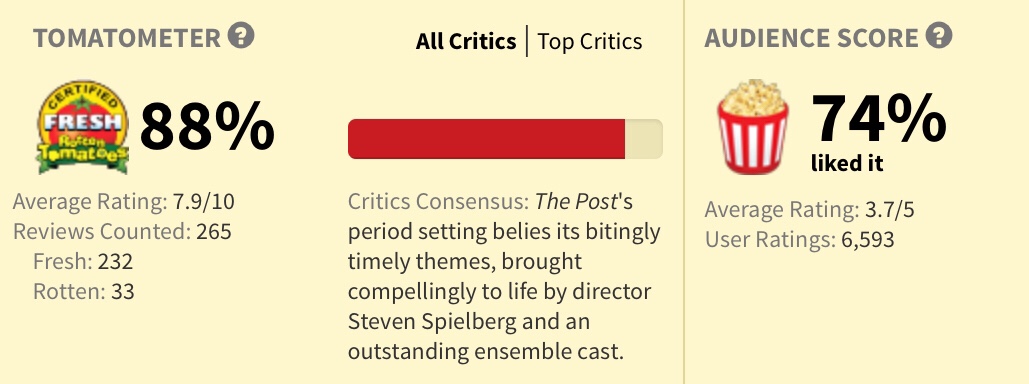The parallels between the story of the Pentagon Papers and the current political climate in the USA are almost too obvious. It’s no secret that this movie is, in effect, Spielberg’s statement on that. I didn’t want another film to make me angry this week. Also I have a real dislike of true-life movies where everyone already knows the ending (Titanic – spoiler: the ship sank! And in this case, it’s one of the most famous First Amendment victories in history. Even this ignorant Brit knows it.) But Spielberg rarely puts out bad movies and his cast here is worth the price on its own.
There’s a line in the trailer: “I’m asking your advice, not your permission.” It really sums up the difficult place Kay Graham (Meryl Streep) finds herself in for most of the movie. We see her constantly surrounded by men in dark suits, men who talk over her, who explain the way it is as if she doesn’t know, men who blithely assume Kay will meekly do as they expect. Kay does little to dispel that impression. In an early scene we see her preparing for a meeting, rehearsing the facts she intends to present. But in the meeting itself, even when invited to speak, she is hesitant and another man makes her case instead. It’s only toward the end of the film, when we see her in her element at a party, that I began to understand her. That her whole life has trained her to behave a certain way and it’s a hard habit to break, even though behind the diffident facade this woman is tough as they come.
Tom Hanks is Ben Bradlee, and he really inhabits the role in a way that’s unusual for Hanks. He’s a great actor but in many of his roles you see Tom Hanks. Here, there’s a physicality to his performance that hides Hanks away inside the character he’s playing. Tom doesn’t pull that off often and it was wonderful to see here.
Ultimately this is a political film with several things to say about the current political scene. Of course it’s about a President who lies like he breathes and is at war with the press to cover up his lies. Of course it’s about the duty of the press to hold power to account and the complex decisions that sometimes go into that.
But the most telling message, to me, is a conversation between Graham and Bradlee about their personal relationships with people in power. They were both friendly with the Kennedys, and Graham is a close friend of the man who wrote the classified report that is the focus and f the film. They discuss how being friendly with such people makes it more difficult to report on them. Defending her many invitations to the White House, Graham points out that when the President invites you, it’s hard to say no. It’s such a contrast to the landscape of today. Now politicians beg media moguls for their time and aTV station can claim to make or break a campaign. Then it was shocking that a President lied to the people. Now we know when our leaders lie: we can see their lips moving.
Yes, the movie is political but it’s also a well-crafted drama that manages to build tension even for an audience that knows the outcome from history. Because the focus is on the characters, on why they made the choices they did, on what they were willing to risk and the prices paid. You care, not about the First Amendment but about the people defending it.
The movie ends, teasingly, with the Watergate break-in. I decided to follow up by watching All The Presidents Men, another true-life movie about many of the same people, which of course begins with that same break-in. And, yes, that’s also a good movie but what a contrast! Kay Graham doesn’t even appear. You wouldn’t know she existed but for a single reference in which a caller attempting to stop the investigation threatens to sexually violate her if they publish. The threat against a woman is made to a man surrounded by men. He repeated it, they laugh and shrug it off.
It’s nice that some things in movies have changed.
For comparison:

